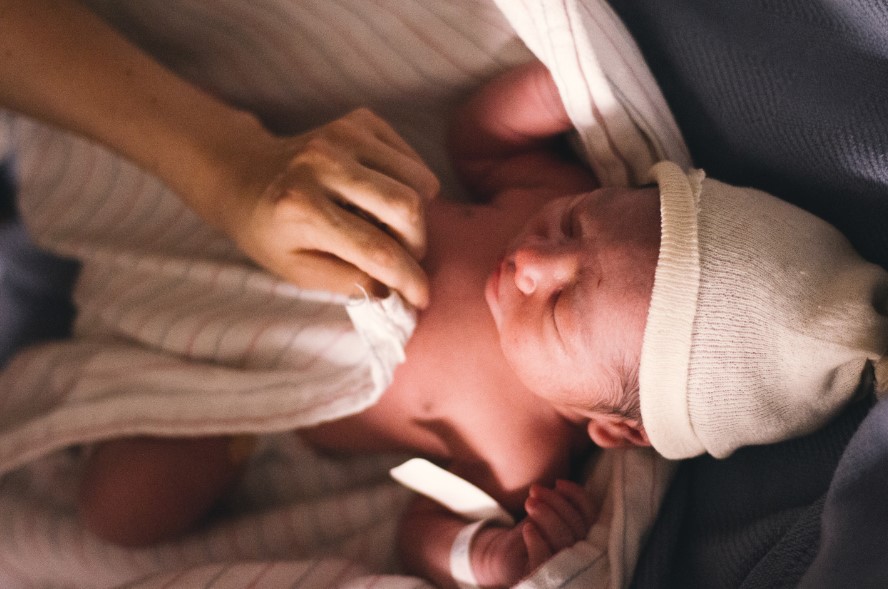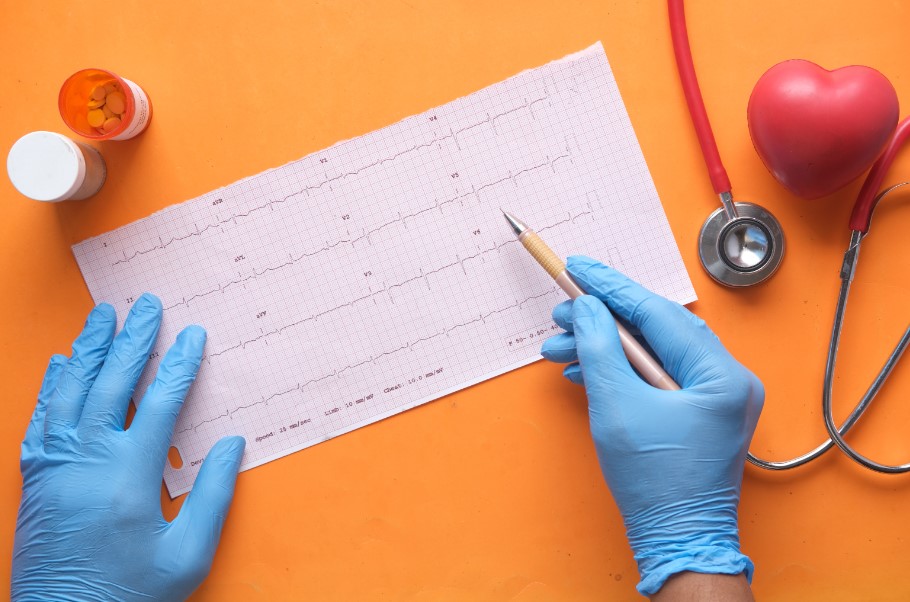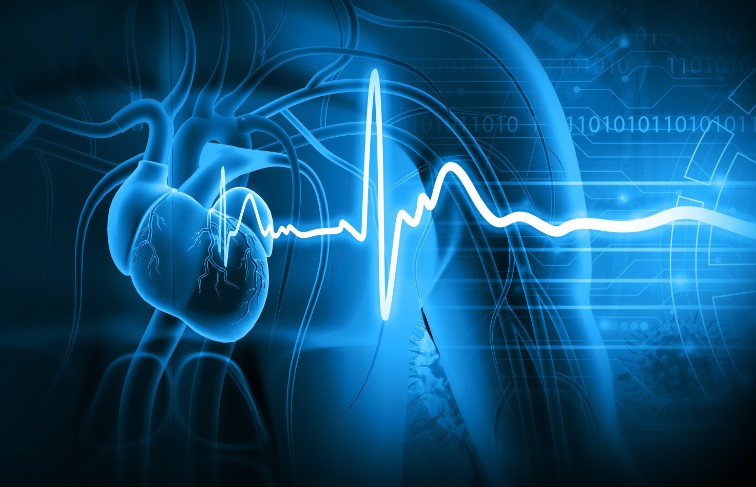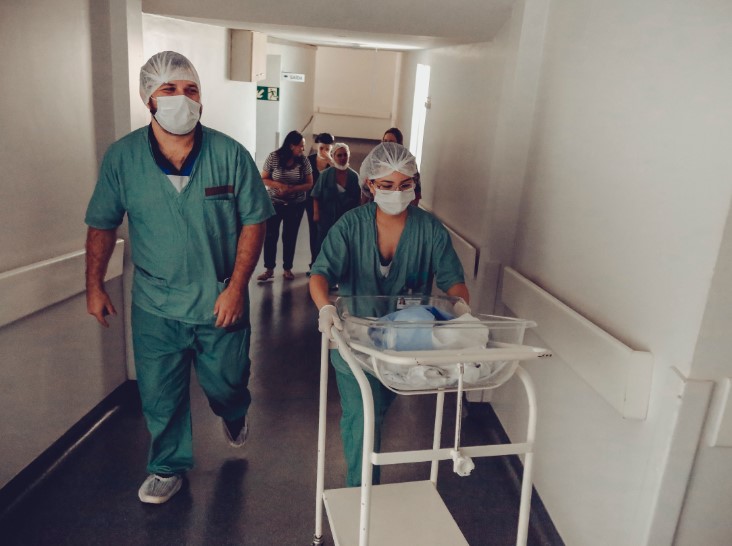Sometimes, babies do things that seem problematic but are actually normal. Like having crossed eyes, pooping explosively, and making sudden jerky movements or strange noises. Especially for new parents, these things could be scary, even though the baby is fine.
Did you know that it’s normal for a newborn’s heart rate (or pulse) to be really fast?
This article provides you with the basic knowledge of the heart rate and how to take your newborn’s heart rate. In addition, you’d learn about normal and abnormal heart rates, their causes, and an extra tip on when to call your pediatrician.
Table of contents:
What’s A Pulse?
Heart rate is also known as pulse. It is the number of times the heart beats in one minute. It can vary throughout the day depending on how much activity you do. The general rule for heart rate is that as the body size increases, heart rate decreases.
Therefore, babies have the highest heart rate in humans.
What makes a newborn’s heart rate so fast?
Interestingly, even while at rest, the heart of a newborn beats as fast as that of an adult who either has a health condition or is working out.
Amazing, right?
Each time the heart beats, it supplies oxygen and removes carbon dioxide from the whole body. This provides the body’s cells with all they need to function and grow.
The truth is, a newborn’s heart rate is so fast because their bodies are doing the amazing work of growing from little, cuddly bundles to crawling at the speed of light to opening doors and running around on their own.
How to Count Your Child’s Heart Rate
You can measure your newborn’s heart rate easily with your fingers. You shouldn’t use your thumb, as it has its own pulse and can give a false reading. Place your index and middle fingers on any of the following places:
- Wrist
- Elbow
- Side of the Neck
- Top of the foot.
These are sites where an artery lies just beneath the skin and is palpable. However, the most common, accurate, and easily accessible location is the wrist.
Put your fingers beneath the thumb and feel the pulse of blood passing through your child’s radial artery (the artery on that side of the hand is known as the radial artery). You will feel the pulsatile movement of blood when you have accurately gotten the spot.

Once you’ve gotten this spot, apply a little pressure, gently. If you cannot feel your child’s pulse at the wrist, there’s no cause for alarm, it may be due to the rather thin artery children have.
Start your timer or stopwatch and count for 60 seconds. Alternatively, you can count for 30 seconds or 15 seconds and then multiply by 2 or four, respectively.

Normal Newborn Heart Rate Range
When assessing a newborn infant’s heart rate, you should measure your newborn’s heart rate when he or she is resting and not running or crying or fussy. The table below shows the age, resting heart rate, and the normal range for heart rate. (Note that bpm stands for beats per minute)
| Age | Average Resting Heart Rate (bpm) | Normal Range (bpm) |
| 0 to 3 months | 143 | 107 to 181 |
| 3 to 6 months | 140 | 104 to 175 |
| 6 to 9 months | 194 | 98 to 168 |
| 9 to 12 months | 128 | 93 to 161 |
| 12 to 18 months | 116 | 88 to 156 |
What Can Increase My Newborn’s Heart Rate?
Your child’s heart rate can be normal, fast, or slow. A fast heart rate is also known as tachycardia. However, it is important to remember that newborns’ heart rates are usually high, even in the absence of any disease condition.
Commonly, a baby who is excited, active, crying, or ill will have a faster heart rate.
However, any of the following specific conditions can increase your newborn’s heart rate:
- Dehydration: Sometimes, dehydration can make your little one’s heart beat faster than it should. This can happen if your baby isn’t getting enough formula or breast milk supply.
- Neonatal Supraventricular Tachycardia (SVT): This is caused by an abnormal (or additional) electrical pathway in your baby’s heart.
- Wilm’s Tumor: This is a type of childhood cancer that increases heart rate in newborns.
What Reduces A Newborn’s Heart Rate?
A slow heart rate is also known as bradycardia. As is expected, when your baby is resting or asleep the heart rate will be slower.
Some of the following specific conditions can cause bradycardia in newborns:
- Hypoxia
- Pneumothorax
- Hypothermia
- Head Injury
Abnormal Heart Rates
In case your child consistently presents with an abnormal heartbeat, your pediatrician may order tests to confirm the presence or absence of any underlying heart condition. Some of these tests include checking your child’s blood pressure, ordering an electrocardiogram (also known as ECG).

The ECG helps your doctor to check for the rhythmicity or the electrical activity of your child’s heart. It also helps your doctor to see if the heart is enlarged or overworking.
Some other tests you may be required to do include blood tests such as a complete blood count or a thyroid test to check for underlying infections and conditions like hyperthyroidism or anemia that can affect your child’s heart rate.
When to Call Your Pediatrician
First of all, you don’t need to regularly check your newborn’s heart rate. However, if your baby has a medical condition that requires you to monitor his/her heart rate, your pediatrician will tell you how often to check it. Especially if there was an initial need for neonatal resuscitation.
Too fast or too slow heart rate can be a cause for a medical emergency, especially if it is associated with any of the following symptoms;
- Difficulty in breathing (too fast or too slow)
- Turning blue (on the lips, nose, or fin gertips)
- Becoming limp or
- Dehydration (Less than 6 wet diapers in 24 hours, sunken eyes, crying without tears, sunken soft spot on skull)
If you observe any of these signs in your baby, please call your pediatrician Immediately.

You should also reach your pediatrician if your child seems to always be at either the upper or lower limits of normal.
A heart rate that is consistently above the upper limit of normal may be a sign of an underlying heart condition. It may also be a sign of other problems in the body such as an infection or a metabolic condition.
In summary, even though newborns usually have a fast heart rate, if you notice any irregularities in your child’s heart rate, you should contact your doctor.
REFERENCES
Owen, C. J., & Wyllie, J. P. (2004). Determination of heart rate in the baby at birth. Resuscitation, 60(2), 213–217. Accessed on 18th August, 2021 from https://doi.org/10.1016/j.resuscitation.2003.10.002
Marek Kozar, Ingrid Tonhajzerova, Michal Mestanik, Katarina Matasova, Mirko Zibolen, Andrea Calkovska & Kamil Javorka (2018). Heart rate variability in healthy term newborns is related to delivery mode: a prospective observational study. BMC Pregnancy and Childbirth volume 18, Article number: 264. Accessed on 18th August, 2021 from https://bmcpregnancychildbirth.biomedcentral.com/articles/10.1186/s12884-018-1900-4
John P. Finley & Sherwin T. Nugent (1995). Heart rate variability in infants, children and young adults. Journal of the Autonomic Nervous System. Volume 51, Issue 2, Pages 103-108. Accessed on 18th August, 2021 from https://doi.org/10.1016/0165-1838(94)00117-3

